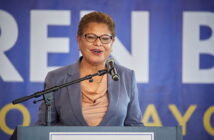By Megan Sayles,
AFRO Business Writer,
msayles@afro.com
Blavity’s AfroTech Executive multi-city conference returned to Washington, D.C. on May 11 at The Gathering Spot, a Black-owned private membership club.
The event brought together corporate executives, investors and tech moguls to learn about trends and innovations in the technology sector.
“AfroTech Executive is a more intimate gathering that is focused on thought leadership with senior executives and movers and shakers who are talking about topics that are going to be important not only today but in the future,” said Jeff Nelson, COO and co-founder of Blavity.
The AfroTech Executive meeting is an extension of Blavity’s flagship AfroTech conference. AfroTech is the largest Black technology conference and will be held in Austin, Texas this November.
AfroTech Executive hosted two panel discussions on the power of collaboration and how it can propel technology ecosystems. Ronnie Kwesi Coleman, co-founder and CEO of Meaningful Gigs and Kori Hale, CEO of CultureBanx participated in the first discussion about the importance of partnerships between American and African tech companies.
The second featured Omi Shelly Bell, CEO and founder of Black Girl Ventures (BGV), and explored how to cultivate and invest in women talent in technology.
Bell, a serial entrepreneur, discussed how her company, BGV, employs pitch competitions, business accelerators and leadership intensives to help Black and Brown women founders access capital and grow their ventures. BGV has funded 450 women-owned businesses through its programming.
Bell advised Black women to build their network and to be their true, authentic selves.
“It is definitely all about authenticity and being who you are. I know that sounds counterintuitive when you’re in rooms and you’re the only person that looks like you and sounds like you,” said Bell. “It can be sort of a sacrifice. However, the rewards, at the end of the day, are unimaginable.”
According to the 2017 Africa Competitiveness Report from the World Economic Forum, Africa is expected to double its 1.2 billion-population by 2050. By 2035, the continent’s working-age population is projected to grow by 70 percent, or 450 million people.
Coleman and Hale both viewed this as an opportunity for economic growth on the continent through mutually-beneficial partnerships between U.S. and Africa’s technology sectors.
“If you’re working with a company or brand and they don’t have strategy and a plan for Africa, they are absolutely missing the mark,” said Hale.
Coleman is capitalizing on the working-age population growth in Africa now.
His company, Meaningful Gigs, trains Africans in digital design skills and connects them with enterprise companies in the U.S. for high-quality, remote freelance work.
Coleman shared a success story about an African designer who was placed with AARP through Meaningful Gigs. As a result of her work, she was able to buy her first home in South Africa.
“We’re in a creative crisis. Companies feel that there’s not enough talent to do all of the creative work, and they’re loading all of the work on a few people that they’re used to hiring, like people from New York and San Francisco,” said Coleman. “That’s killing creativity because people are trying to design for too many things, and they’re churning and burning. We’re not short of talent or people, we just have to look around the globe,” he continued.
Megan Sayles is a Report for America Corps member.



